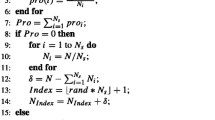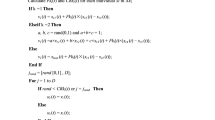Abstract
Evolutionary algorithms have been used in numerous real-world applications and proven to have virtuous convergence properties. Despite several drawbacks, population initialization in absence of any priori information available is one of them to affect the convergence rate. To address this problem, we propose a new method of population initialization based on the opposite point. Differential evolution (DE), one of the well-known evolutionary algorithms, has been embedded with this new method of population initialization. Differential evolution with this initialization method is called opposite point-based differential evolution (OPDE). In this paper, we discuss and evaluate the performance of DE and OPDE algorithms. In particular, an empirical comparison between results obtained using DE and OPDE is presented along with those reported in the literature. To assure a fair comparison, we test the algorithms using twenty-four well-known unimodal and multimodal, low-dimensional and high-dimensional, benchmark functions with three different termination criteria. The results demonstrate that OPDE successfully accelerates with a high convergence rate and outperforms the DE and other opposition learning-based differential evolution reported in the literature for most of the benchmark functions considered in the present study.
Access this chapter
Tax calculation will be finalised at checkout
Purchases are for personal use only
Similar content being viewed by others
Abbreviations
- fmin:
-
Best value obtained of objective function
- fmax:
-
Worst value obtained of objective function
- TC1:
-
Termination criterion 1
- TC2:
-
Termination criterion 2
- TC3:
-
Termination criterion 3
- NFE:
-
Number of function evaluations
- D:
-
Dimensions
- NP:
-
Population size
- CR:
-
Crossover constant
- F:
-
Scaling factor
References
Goudos, S.K., Baltzis, K.B., Antoniadis, K., Zaharis, Z.D., Hilas, C.S.: A comparative study of common and self-adaptive differential evolution strategies on numerical benchmark functions. Procedia Comput. Sci. 3, 83–88 (2011). https://doi.org/10.1016/j.procs.2010.12.015
Deka, D., Datta, D.: Optimization of crude oil preheating process using evolutionary algorithms. In: Das, B., Patgiri, R., Bandyopadhyay, S., Balas, V.E. (eds.) Modeling, Simulation and Optimization. Smart Innovation, Systems and Technologies, vol. 206. Springer, Singapore (2021). https://doi.org/10.1007/978-981-15-9829-6
Das, S., Suganthan, P.N.: Differential evolution: a survey of the state-of-the-art. IEEE Trans. Evol. Comput. 15, 4–31 (2011). https://doi.org/10.1109/tevc.2010.2059031
Storn, R., Price, K.: Differential evolution: a simple and efficient adaptive scheme for global optimization over continuous spaces. J. Glob. Optim. 23 (1995)
Storn, R., Price, K.: Differential evolution—a simple and efficient heuristic for global optimization over continuous spaces. J. Glob. Optim. 11, 341–359 (1997)
Price, K., Storn, R., Lampinen, J.: Differential Evolution—A Practical Approach to Global Optimization. Springer, Berlin, Germany (2005)
Rahnamayan, S., Tizhoosh, H.R., Salama, M.M.A.: Opposition-based differential evolution. IEEE Trans. Evol. Comput. 12, 64–79 (2008). https://doi.org/10.1109/tevc.2007.894200
Liu, J., Lampinen, J.: A fuzzy adaptive differential evolution algorithm. Soft. Comput. 9, 448–462 (2005). https://doi.org/10.1007/s00500-004-0363-x
Brest, J., Greiner, S., Boskovic, B., Mernik, M., Zumer, V.: Self-adapting control parameters in differential evolution: a comparative study on numerical benchmark problems. IEEE Trans. Evolut. Comput. 10, 646–657 (2006). https://doi.org/10.1109/tevc.2006.872133
Teo, J.: Exploring dynamic self-adaptive populations in differential evolution. Soft. Comput. 10, 673–686 (2006). https://doi.org/10.1007/s00500-005-0537-1
Ali, M.M., Törn, A.: Population set-based global optimization algorithms: some modifications and numerical studies. Comput. Oper. Res. 31, 1703–1725 (2004). https://doi.org/10.1016/s0305-0548(03)00116-3
Tasoulis, D.K., Pavlidis, N.G., Plagianakos, V.P., Vrahatis, M.N.: Parallel differential evolution. In: Proceedings of 2004 Congress Evolutionary Computation (CEC-2004), pp. 2023–2029 (2004). https://doi.org/10.1109/cec.2004.1331145
Noman, N., Iba, H.: Enhancing differential evolution performance with local search for high dimensional function optimization. In: Proceedings of Genetic and Evolutionary Computation Conference (GECCO 2005), pp. 967–974, Washington DC, USA, June 25–29 (2005). https://doi.org/10.1145/1068009.1068174
Fan, H.Y., Lampinen, J.: A trigonometric mutation operation to differential evolution. J. Glob. Optim. 27, 105–129 (2003). https://doi.org/10.1023/a:1024653025686
Kaelo, P., Ali, M.M.: Probabilistic adaptation of point generation schemes in some global optimization algorithms. Optim. Methods Softw. 21, 343–357 (2006). https://doi.org/10.1080/10556780500094671
Rahnamayan, S., Tizhoosh, H.R., Salama, M.M.A.: A novel population initialization method for accelerating evolutionary algorithms. Comput. Math. Appl. 53, 1605–1614 (2007). https://doi.org/10.1016/j.camwa.2006.07.013
Esmailzadeh, A., Rahnamayan, S.: Opposition-based differential evolution with protective generation jumping. In: IEEE Symposium on Differential Evolution, pp. 1–8 (2011). https://doi.org/10.1109/sde.2011.5952059
Onwubolu, G.C., Babu, B.V.: New Optimization Techniques in Engineering. Springer, Berlin, New York (2004)
Storn, R.: On the usage of differential evolution for function optimization. In: Proceedings of the North American Fuzzy Information Processing, Berkeley, CA, USA, pp. 519–523, June 19–22 (1996). https://doi.org/10.1109/nafips.1996.534789
Sarker, R.A., Elsayed, S.M., Ray, T.: Differential evolution with dynamic parameters selection for optimization problems. IEEE Trans. Evolut. Comput. 18, 689–707 (2014). https://doi.org/10.1109/tevc.2013.2281528
Tizhoosh, H.R.: Reinforcement learning based on actions and opposite actions. In: International Conference on Advances and Applications of Artificial Intelligence and Machine Learning (AIML-2005), Cairo, Egypt (2005)
Acknowledgements
Financial support from the Guru Gobind Singh Indraprastha University is gratefully acknowledged.
Author information
Authors and Affiliations
Corresponding author
Editor information
Editors and Affiliations
Rights and permissions
Copyright information
© 2024 The Author(s), under exclusive license to Springer Nature Singapore Pte Ltd.
About this paper
Cite this paper
Yadav, S., Angira, R. (2024). A New Method of Population Initialization for Enhancing Performance of Evolutionary Algorithms. In: Das, B., Patgiri, R., Bandyopadhyay, S., Balas, V.E., Roy, S. (eds) Modeling, Simulation and Optimization. CoMSO 2022. Smart Innovation, Systems and Technologies, vol 373. Springer, Singapore. https://doi.org/10.1007/978-981-99-6866-4_4
Download citation
DOI: https://doi.org/10.1007/978-981-99-6866-4_4
Published:
Publisher Name: Springer, Singapore
Print ISBN: 978-981-99-6865-7
Online ISBN: 978-981-99-6866-4
eBook Packages: Intelligent Technologies and RoboticsIntelligent Technologies and Robotics (R0)




